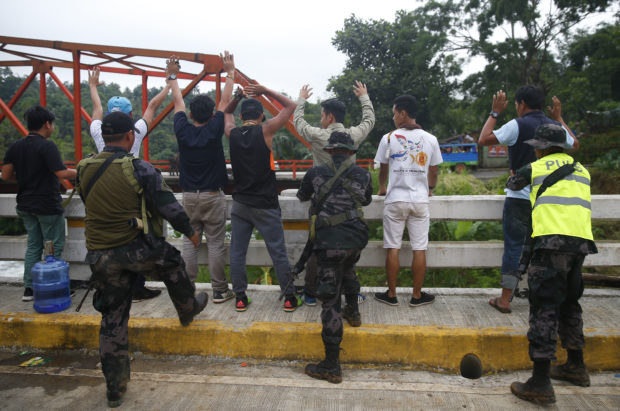
Men are frisked by police at a checkpoint as they leave Marawi City in his photo taken May 25, 2017. Among the complaints about martial law in Mindanao is the ‘automatic’ suspicion against Moros at checkpoints, according to Datu Alvin Camandong of the Alliance of Tri-people for the Advancement of Human Rights. AP FILE / BULLIT MARQUEZ
Human rights groups and peace advocates from Mindanao have stepped up calls for the lifting of martial law in the region, citing “massive” rights violations that have only remained unreported due to the victims’ fear of retaliation.
“The most striking challenge [for rights groups] is the documentation of the violations. This is the biggest weakness because of the wide scope of martial law and the violations arising from it,” said Rose Trajano of the Philippine Alliance of Human Rights Advocates (Pahra) during a press conference at the University of the Philippines in Diliman, Quezon City, Saturday evening.
“There have been massive violations, but our Moro and indigenous brothers and sisters in Mindanao just can’t speak up due to fear and shame. It’s not in their culture to talk about it, so how will we be able to reveal the stories?” Trajano said.
The presser was held following the day-long Solidarity Conference on Human Rights, Peace, Justice and Democracy, which gathered various human rights groups to discuss concerns on the ongoing implementation of martial law in Mindanao.
President Rodrigo Duterte declared martial law over the whole of the South last May 23, in response to self-proclaimed Islamic State (ISIS) supporters who laid siege to Marawi City. The move has been criticized by rights groups that say a region-wide coverage was unnecessary, baseless, and prone to abuse.
Charity Lavandero of the Mindanao People’s Peace Movement said that to get rights victims to speak up in Mindanao, advocates would first have to “secure the victims” or provide them sanctuary, while being “responsive to their cultural sensitivities.” Most of the evacuees from Marawi are Maranao.
“Right now it’s difficult, because they are evacuees whose rights have also been violated. It is natural that they will get scared. The first thing they always ask is ‘Can you secure us?’” Lavandero said.
Proposed ID systems for Muslims following the Marawi siege, Trajano said, proved that “the rights of the Moro are being violated, that they are discriminated against, and are continually being abused.”
In addition, the deployment of police officers accused of misdemeanor and human rights violations in Mindanao “only adds insult to injury for the Moros,” Trajano said.
At the same conference, Davao Occidental and Sarangani-based Datu Alvin Camandong of the Alliance of Tri-people for the Advancement of Human Rights said the implementation of martial law so far primarily “centers” on Moro or Muslim Mindanaoans.
Camandong narrated stories “of Muslims being treated differently” since martial law was implemented in Mindanao.
He cited cases of local fishermen being accused by the Coast Guard of piracy; Moro rights advocates being accused of coddling terrorism; “automatic” suspicion against Moros at checkpoints, especially those without IDs; not being allowed to retrieve or bury their dead in Marawi; Muslim religious leaders not being allowed to go around areas; and farmers caught in land conflicts having to lie low in fear of facing rebellion charges if they press their ownership rights.
“Martial law is being used as capital,” Camandong said.
In an inteview, Camandong said that, while the Duterte administration over the past year had given some “advantages” for the Moro people, such as pushing for the continuation of peace talks with Muslim groups and for the Bangsamoro Basic Law, the “disadvantages” weighed heavier.
“The trust of the Moro people [on Duterte] has been lost because of what is happening in Mindanao,” Camandong said. “Martial law focuses on us. We are discriminated against. As long as you are Moro, you are treated differently.”
“Our appeal, as Bangsamoro, is to call for a stop to martial law,” he added. “As a Moro, I can say it’s not a solution to the Maute Group. But it is affecting all Moros. “What Moro citizens want are the peace talks, where we are fighting for legitimate rights.”
Trajano expressed hope that there would be an “automatic” stop of martial law implementation on July 23, when the 60-day implementation period is supposed to lapse.
But she added: “We are scared of a possible extension or expansion of martial law.” /atm